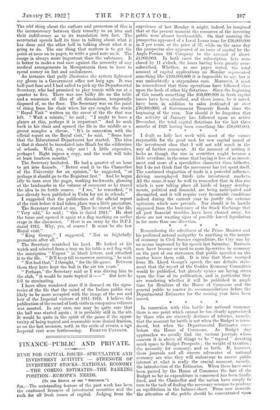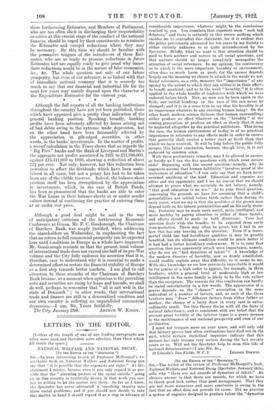FINANCE—PUBLIC AND PRIVATE.
RUSH FOR CAPITAL ISSUES—SPECULATIVE AND INVESTMENT ACTIVITY — STRENGTH OF INVESTMENT STOCKS—NATIONAL ECONOMY THE COMING ESTIMATES—THE BANKING POSITION—EUROPE'S NEEDS.
[To THE EDITOR OF SRI " SPECTATOR.") Sis,—The outstanding feature of the past week has been the continued firmness of investment securities and the rush for all fresh issues of capital. Judging from the experience of last Monday it might, indeed, be imagined that at the present moment the resources of the investing public were almost inexhaustible. On that morning the prospectus appeared of a Local Loans issue for £30,000,000 in 3 per cents. at the price of 57, while on the same day the prospectus also appeared of an issue of capital by the Anglo-Persian Oil Company to the amount of about 14,000,000. In both cases the subscription lists were closed by 11 o'clock, the loans having been greatly over- subscribed. Whether, as one paper stated, the total amount of capital applications on Monday represented something like £100,000,000 it is impossible to say, but it was undoubtedly a stupendous sum. Moreover, it must be remembered that these operations have followed close upon the heels of other big flotations. Since the beginning of this month something like £60,000,000 in fresh capital issues have been absorbed, and these issues, be it noted, have been in addition to sales (estimated at over £70,000,000) of Government Treasury Bonds since the beginning of the year. Nor should it be forgotten that the activity of January has followed upon an active December, the total capital flotations for the last three months of 1921 having been something like £70,000,000. * * * * I dealt so fully last week with most of the causes responsible for the great rush for new capital issued of the investment class that I will not add much in the way of further comment. At the moment of writing it looks as though the rise in securities might become a little overdone, in the sense that buying is less of an invest- ment and more of a speculative character than hitherto, but I do not think that the movement has yet spent itself. The continued stagnation of trade is a powerful influence, driving unemployed funds into investment markets. All the same, it may be well to remember that in this rise which is now taking place all kinds of happy develop- ments, political and financial, are being anticipated and discounted, and it will require very favourable conditions indeed during the current year to justify the extreme optimism which now prevails. Nor should it be hastily supposed from the buoyancy of the Stock Exchange that all past financial troubles have been cleared away, for there are not wanting signs of possible forced liquidation in far more than one direction. * * * Remembering the adroitness of the Prime Minister and his profound natural antipathy to anything in the nature of economy in Civil Service expenditure, the City was by no means impressed by his speech last Saturday. Business men have become so used to mere lip-service to economy on the part of our statesmen that public speeches on the matter leave them cold. It is true that there emerged from Mr. Lloyd George's speech the one definite state- ment that the report of the Geddes Economy Committee would be published, but already cynics are laying stress upon the time of its publication, and in particular they are wondering whether it will be published in ample time for Members of the House of Commons and the general public to master its recommendations before the Departmental Estimates for the coming year have been issued.
In connexion with this battle for national economy there is one point which cannot be too clearly appreciated by those who are sincerely desirous of reforms, namely, that the moment for battle is not when the Budget is intro- duced, but when the Departmental Estimates come before the House of Commons. As Budget day approaches we usually find the various journals whose concern it is above all things to be " topical " devoting much space to Budget Prospects ' • the weight of taxation ; the necessity for economy, and so forth. If, however, these journals and all sincere advocates of national economy are wise they will endeavour to arouse public interest at what is really the crucial moment, namely, the introduction of the Estimates. When these have once been passed by the House of Commons the fate of the Budget So far as expenditure is concerned has been finally fixed, and the Chancellor and the nation have simply to turn to the task of finding the necessary revenue to produce an equilibrium in the balance-sheet. From now onwards the attention of the public should be concentrated upon these forthcoming Estimates, and Members of Parliament, who are too often slack in discharging their responsibility as critics at this crucial stage of the conduct of the national finances, should be urged by their constituents to scrutinize the Estimates and compel reductions where they may be necessary. By this time we should be familiar with the persuasive tongues of the introducers of these Esti- mates, who are so ready to promise reductions in future Estimates but are .equally ready to give proof why imme- diate reductions would be in the nature of false economies, &c., &c. The whole question not only of our future prosperity, but even of our solvency, is so linked with that of immediate national economy that it is scarcely too much to say that our financial and industrial life for the next few years may mainly depend upon the character of the Expenditure Estimates for the current year.
Although the full reports of all the banking institutions throughout the country have not yet been published, those which have appeared give a pretty clear indication of the general banking position. Speaking broadly, banking profits have been adversely affected by losses arising out of bad debts owing to the extreme trade depression, but on the other hand have been favourably affected by the appreciation in gilt-edged securities, in other words, in the banks' investments. In the matter of profits, a recent calculation in the Times shows that as regards the " Big Five " banks and the Bank of Liverpool and Martin's the aggregate net profits amounted in 1921 to £11,956,000, against £15,411,000 in 1920, showing a reduction of about 22i per cent. Not only, however, has this reduction been powerless to affect the dividends, which have been main- tained in all cases, but not a penny has had to be taken from any of the visible reserves. Indeed, the balance-sheet position itself has been strengthened by the appreciation in investments, which, in the case of British Funds, has been so pronounced that the banks are able to enter the War Loans in their balance-sheets at or under market values instead of continuing the practice of entering them at or under cost price.
* * * * Although a good deal might be said in the way of anticipatory criticism of the forthcoming Economic Conference at Genoa, Mr. F. C. Goodenough, the Chairman of Barclays Bank, was amply justified, when addressing the shareholders on Wednesday, in emphasizing the fact that no return to full commercial prosperity can be expected here until conditions in Europe as a whole have improved. Mr. Goodenough reminds us that the present total volume of international trade does not exceed one half of its pre-War volume and the City fully endorses his assertion that it is, therefore, easy to understand why it is essential to make a determined effort to restore the financial stability of Europe as a first step towards better markets. I am glad to call attention to these remarks of the Chairman of Barclays Bank because, at a moment when optimism is the prevailing note and securities are rising by leaps and bounds, we shall do well, perhaps, to remember that all is not well in the state of Denmark " ; in other words, that international trade and finance are still in a demoralized condition and our own country is suffering an unparalleled commercial depression.—I am, Sir, Yours faithfully,



































 Previous page
Previous page